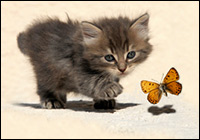Pet Articles
House Cats that Hunt

It is perhaps the greatest annoyance of every cat owner; you come home from work at the end of a long day not only to your furry feline, but also to the furry mouse carcass she so lovingly drops at your feet. You wake up on a Saturday morning and instead of toast and jam, your cat’s idea of breakfast in bed involves a mess of blood and bird feathers not the most appetizing site. So you yell and shake your finger and do all of those things we feel inclined to do when our cats misbehave, but it won’t make any difference. Our cats don’t know they’re misbehaving. They’re simply acting out one of the most natural behaviours in their repertoire. Hunting and predatory behaviour in domestic cats are deeply rooted instincts, and ones that you might just have to learn to accept in your pet.
Cats are natural born hunters. In fact, it was for this very reason that cats were first domesticated thousands of years ago. Back when people first start growing crops and storing food, the cat’s extraordinary hunting ability was revered. They played an important role in controlling rodent problems, and, lucky for us, turned out to make wonderful companions as well. Over the years, of course, and with better pest control available, the role of cats in our society has changed significantly. What has not changed, however, are cats themselves. From their razor sharp teeth and claws, to their specialized metabolism and digestive systems, the domestic cat makes a mean meat-eating machine to this day.
Contrary to popular belief, a cat who hunts does not do so because he is starving, or not well cared for. Even the most satiated and apparently docile cat will partake in hunting behaviour. Spikes in metabolism are responsible for the sudden bursts of energy that interrupt the otherwise long and lazy days of pet cats. These energetic moments, which are often some of our pets’ most playful periods, are also when patterns of predatory behaviour tend to instinctively emerge. Just as cats will pounce at the sight of a toy we dangle above their heads and throw across the room, so will they react to most any small, fast-moving object (such as a mouse). Also, much like at play time, cats most certainly derive pleasure from the stalking, pouncing, and chasing associated with a good hunt.
This is not to say that all cats think of hunting as simply fun and games. For some, becoming a proficient hunter is something that is practiced and honed from a very young age. Young kittens who are allowed to remain with their mother will be taught all of the most important hunting basics. Their mothers begin by bringing back prey (dead or alive) for their young to practice and experiment with. Later the kittens will observe their mother’s hunt, until ultimately they are ready to attempt the techniques on their own. This sort of learning, while not necessary to stimulate hunting behaviour in cats, may impact the onset and likelihood of such behaviours in pets.
So now that you know why your cat hunts the way she does, what can you do about it? The answer, unfortunately, is not a whole lot. Some owners have solved the ‘problem’ by attaching a bell to their cat’s collar, thereby giving potential prey items fair warning. While this method might work in a small minority of cats, most are stealthy enough to learn how to keep these collars quiet for the duration of the hunt. The best solution is to keep your cat indoors, especially during dusk and dawn when they are most likely to get into predatory mode. If you feel that you must bring them outside, do so in confined areas or keep them on a haltered leash. Finally, you might be wondering, what is the best way to react when your fluffy but deadly pet returns home to bring you a partially digested present? Well, perhaps you might give her a pat on the head before you dispose of the gift. After all, she probably sees you no different from her kittens or other kin; she’s doing you a service, bringing you a snack, bonding with you the same way you do when you give her a cat treat. Domestic cats who hunt are not misbehaving, they are simply doing what they were designed to do, and behaving the only way they know how.
By Alison Norwich – Pets.ca writer
